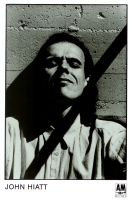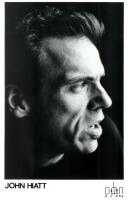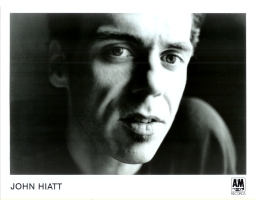|
JOHN HIATT
fits the role of
a hero in a classic Capra film: a bright, forthright, unpretentious guy
from the Heartland. But one who also happens to have an uncanny genius for
putting into song the ways that real people talk, think, love-and
occasionally screw things up.
It's not surprising,
then, that Hiatt's latest album, Bring the Family, is a Capraesque
journey through emotional struggles to a denouement of joy and hope. Like
a man who gratefully emerges from a long, dark tunnel into the light,
Hiatt acknowledges the happy ending but isn't afraid to look back at the
often rough road that brought him there. And, winding through the album's
tracks, shielding them from the specter of oversentimentality, is his
distinctive off-center wit.
Bring the Family
is also a
grassroots effort of sorts, the first of Hiatt's eight albums to truly
capture on vinyl the raw power and emotion he brings to his performances.
For the effort, producer John Chelew gathered together a trio of superbly
simpatico players for backup: Ry Cooder (guitar, vocals), Nick Lowe (bass,
vocals) and Jim Keltner (drums). A four day marathon of live-in-the-studio
recording ensued. Hiatt describes the result as "the most honest record
I've ever made.”
It was, more than
anything, a case of recognizing the obvious. As concert coordinator for
McCabes in Santa Monica, Chelew had been watching Hiatt's solo acoustic
shows at the club for nearly a decade. "I never thought John's records
matched his live performances” Chelew explained. "His songs seemed to cut
through more cleanly when it was just him and his guitar or piano. So i
began wondering how he could make a record that captured the honesty and
integrity of his live shows, but would be more than a solo studio album”
Hiatt was characteristically agreeable.
"John said, 'You
ought to get Cooder, Keltner and a great bass player, and just go in and
do what you do with your guitar and voice. Don't mess around-pick 10 great
songs and do it: i said, 'If you want to get it together, I'll show up and
the next week he had it together;' Hiatt noted. "That's all it took.”
Cooder and Keltner
were logical choices. Cooder and Hiatt had toured with each other's bands;
Hiatt had also guested on several Cooder albums (including Borderline,
The Slide Area and soundtracks for "The Border" and "Alamo Bay").
Keltner, of course, has long been a respected session drummer for Cooder
and others. Lowe, who co-produced Hiatt's Riding With The King lp
and also recorded his "She Don't Love Nobody," was both artist and
producer's first choice for bass; but it took a frantic flurry of
transoceanic phone calls to locate him over a holiday weekend to see if he
was available. He finally got word of the project late one night, just
prior to the recording date, and hopped the next flight to L.A. He walked
into the studio without having heard, much less played, any of the songs.
Cooder and Keltner had heard live demos for the first time only two days
earlier.
"There were no
rehearsals_ Hiatt recalled. "I'd sit there with an acoustic guitar and say,
'Well, here's how it goes: We'd run it down a couple of times and start
taping. It was putting your music where your mouth usually is, you know.
Shut up and play:'
It wasn't the
easiest way to make a record -exhaustion set in about Day 3-but, in
Hiatt's opinion, it was the best way. "It was a very intense four days of
music making… absolutely the highest I've ever been in a musical setting”
he said. "I'll probably be telling my grandkids about it in 30 years”
The intensity of the
recording process was mirrored in the songs themselves. Many of the 10
cuts were written only a month or two before they were recorded. That
sense of fresh discovery in both the vocals and the instrumental
arrangements is audible in the grooves. "Memphis in the Meantime" kicks
off the record with an upbeat plea to escape the 'heartfelt steel guitar'
of Nashville for a quick fix of Memphis rhythm and soul food. In "Alone in
the Dark” a spooky Cooder intro melts into a Hiatt vocal that is at once
gritty and smooth; like the R&B hits Hiatt teethed on, this is a gem of
the highest I -feel-so- bad-but-sound-so-good degree. In contrast, "Thing
Called Love" is a jumping tune that illustrates Hiatt's penchant for droll
rhymes. Lowe's playful bass lines and Keltner's skittish beat add to the
fun. "Lipstick Sunset” the oldest song on the lp, written just after Hiatt
moved to Nashville in 1985, is replete with a Gulf Coast ambiance,
compliments of Cooder. The side closes with a powerful affirmation of
love and loyalty, "Have a little Faith in Me” the cut that most clearly
demonstrates the force of Hiatt's interpretive ability. No high tech
wizardry: just the man and his piano.
Side two follows a
similar trail, from the celebration of newfound love in the roots, "Thank
You Girl" to the aching ballad of regret in "Tip of My Tongue” One of
Hiatt's strong suits is his ability to examine the emotional havoc in
romantic attachments, in this case the irreparable hurt caused by saying
the wrong thing-or nothing. Next stop, suburbia with its everyday trials
of family love and of coming to terms with adulthood. In "Your Dad Did” a
cut sure to make Baby Boomers wince while they laugh, Hiatt paints a
true-to-life portrait that somehow isn't quite like that of the Cleavers.
("The food is cold and your wife feels old / But all hands fold and the
two-year-old says grace / She says, help the starving children to get well
/ But let my brother's hamster burn in hell”) "Stood Up" changes the scene
again, juxtaposing wordplay against a serious ballad that traces a life
of rebellion, failed relationships and battles with the bottle. Yet the
real story is of a man who's grown the hard way, but survived to live and
love anew in the tender "Learning How To Love You”
"I suppose I've
always covered the same ground, albeit sometimes more cynically than
others” Hiatt noted. "These songs are less smart-ass and much more
positive. But they're still basically about men and women, which has
always been my favorite territory.”
Bring the Family
traces
the bumpy but ultimately satisfying path of life's ups and downs. Hiatt's
included.
Born and raised in
Indiana, he started writing songs at 11. (He estimates his total output
at around 600 songs-so far. They've been recorded by scores of singers
from all over the musical map, Conway twitty to Dr. Feelgood.) Intent on
making a career of it, he left high school at 16 to work as an inhouse
writer for Tree Publishing in Nashville. After recording an early lp on
Uni with a band called White Duck, he later signed with Epic and released
Hangin' Around the Observatory in 1974 and Overcoats in
1975. He hit the road, touring folk clubs and festivals across North
America, and building a loyal cult following in the process. By 1979, he
had moved to L.A. and, caught up in the New Wave scene, gotten signed to
MCA. Slug Line was released that year, followed by Two-Bit
Monsters in 1980, with some film and television soundtrack action in
between. He later recorded three albums for Geffen, All of a Sudden
in 1982, Riding With the King in 1983 and Warming Up to
the Ice Age in 1985. (He has also appeared on a couple of English EPs,
one a solo live performance and the other as a guest vocalist with Los
Lobos, and on Peter Case's critically acclaimed album.) Looking at roots
acts like Los Lobos and John Fogerty that have attracted a broad base of
fans from different age and income groups, Chelew sees a perfect niche
there for John Hiatt.
"This music appeals
to a whole group of people who definitely aren't yuppies. It's for the guy
who works for the telephone company, has a wife or a girlfriend with kids
from a previous marriage, puts them in his 4 x 4 and heads for the
mountains for Memorial Day weekend” Chelew said. "People like that will
love this record” People like that - and a lot more besides. |
|
allmusic.com
In 1987,
John Hiatt, clean and sober and looking for an American record deal, was
asked by an A&R man at a British label to name his dream band. After a
little thought, Hiatt replied that if he had his druthers, he'd cut a
record with Ry Cooder on guitar, Nick Lowe on bass, and Jim Keltner on
drums. To Hiatt's surprise, he discovered all three were willing to work
on his next album; Hiatt and his dream band went into an L.A. studio and
knocked off Bring the Family in a mere four days, and the result was the
best album of Hiatt's career. The musicians certainly make a difference
here, generating a lean, smoky groove that's soulful and satisfying (Ry
Cooder's guitar work is especially impressive, leaving no doubt of his
singular gifts without ever overstepping its boundaries), but the real
triumph here is Hiatt's songwriting. Bring the Family was recorded after a
period of great personal turmoil for him, and for the most part the archly
witty phrasemaker of his earlier albums was replaced by an wiser and more
cautious writer who had a great deal to say about where life and love can
take you. Hiatt had never written anything as nakedly confessional as "Tip
of My Tongue" or "Learning How to Love You" before, and even
straight-ahead R&B-style rockers like "Memphis in the Meantime" and "Thing
Called Love" possessed a weight and resonance he never managed before. But
Bring the Family isn't an album about tragedy, it's about responsibility
and belatedly growing up, and it's appropriate that it was a band of
seasoned veterans with their own stories to tell about life who helped
Hiatt bring it across; it's a rich and satisfying slice of grown-up rock &
roll.
|
|
thing
called love
A lot of
people know this song, but not because they've ever heard John Hiatt sing
it. Like most of Hiatt's hit tunes, this one was a hit for someone else;
in this case, it was a major factor in the revival of Bonnie Raitt's
career. Hiatt's version is much more rawboned than Raitt's, and it has an
emotional resonance that only comes across in the larger context of Bring
the Family, a sometimes harrowing roller coaster of an album that
chronicles Hiatt's return from the edge of an alcoholic abyss and back to
the bosom of traditional (if not uncomplicated) family life. This song,
and the album as a whole, represents one of those rare musical synergies
that will sometimes coalesce out of nowhere — Hiatt went into the studio
with bassist Nick Lowe, slide guitarist Ry Cooder, and drummer Jim Keltner,
and the four of them created a magic rooted in wry, dead-on emotional
observation and sometimes subtle flashes of instrumental genius (like
Cooder's quick rockabilly flourish in the out chorus of "Thing Called Love,"
or his long, heart-rending glissando in the first solo on "Lipstick Sunset").
"Thing Called Love" is that rarest of things in pop music, a grown-up song
about love. Hiatt knows that love doesn't fix anything ("Ugly ducklings
don't turn into swans/And glide off down the lake") and he harbors no
illusions about his own motivations ("We may not even have our dignity/This
may be just a prideful thing"), but that doesn't stop him from committing
to it anyway: this is, above all, a song about marriage. The song
expresses a gritty, realistic, and romantic vision that is undergirded by
the unbeatable combination of Cooder's gritty, realistic, and romantic
slide guitar and a brilliantly understated rhythm section. This magic
turned out to be unrepeatable — these guys tried it again as Little
Village a couple of years later, and failed miserably — but for four days
in February of 1987, Hiatt and his accomplices were in the zone, and the
musical result was quietly spectacular. |













